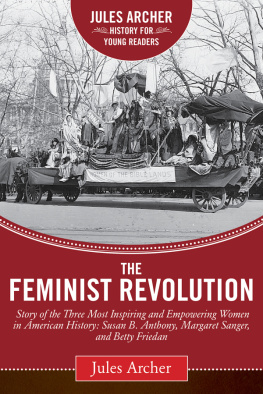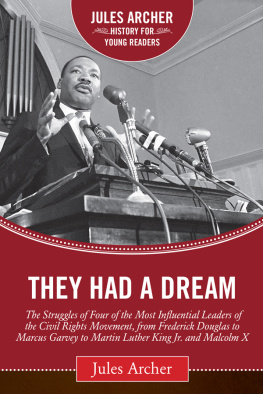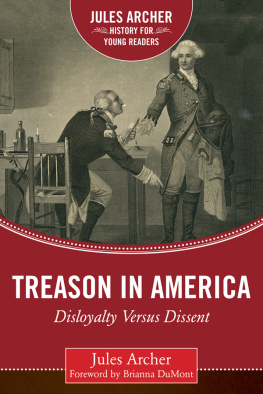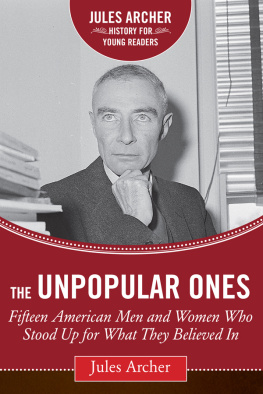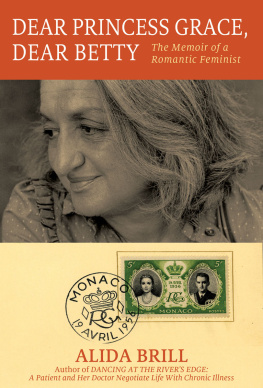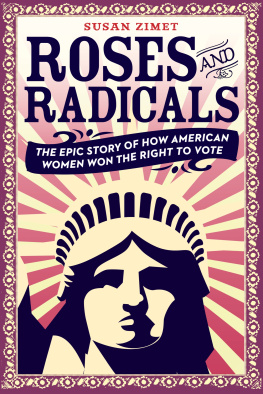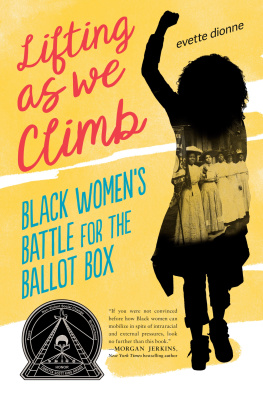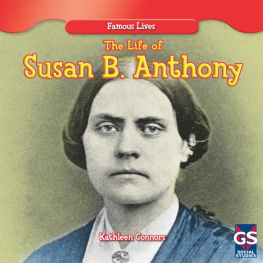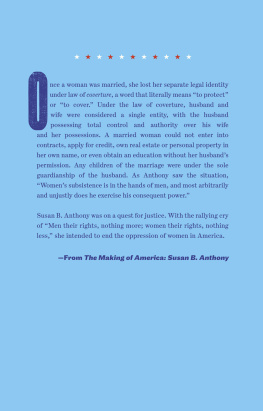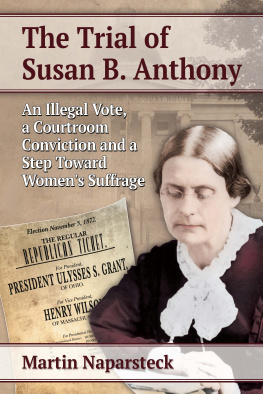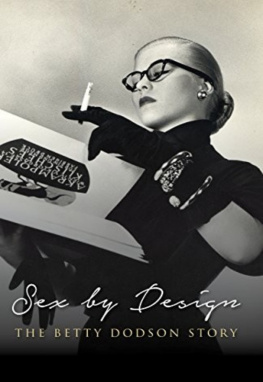Susan B. Anthony 18201906
Women have been taught always to work for something else than their own personal freedom.
Margaret Sanger 18791966
In The Woman Rebel, Sanger offered specific information on birth control for girls aged fourteen to eighteen: In this present chaos of sex atmosphere, it is difficult to know just what to do, or really what constitutes clean living without prudishness.
Betty Friedan 19212006
Friedan wrote the purpose of the National Organization for Women (NOW) on a paper napkin: To take the actions needed to bring women into the mainstream of American society, now; full equality for women, in fully equal partnership with men.
Historical texts often reflect the time period in which they were written, and new information is constantly being discovered. This book was originally published in 1975, and much has changed since then. While every effort has been made to bring this book up to date, it is important to consult multiple sources when doing research.
Copyright Jules Archer, 1991
Foreword 2015 by Sky Pony Press, an imprint of Skyhorse Publishing, Inc.
First Sky Pony Press edition, 2015
Photograph credits: Matthew Cobleigh Photography, Pasadena, CA: 108;
Bettye-Lane: 129 (bottom), 133, 136; The Library of Congress: 18, 33 (bottom), 43, 57, 60; Planned Parenthood Federation of America, Inc.: 62, 87, 97, 103; Paul Schraub: 129 (top)
All rights reserved. No part of this book may be reproduced in any manner without the express written consent of the publisher, except in the case of brief excerpts in critical reviews or articles. All inquiries should be addressed to Sky Pony Press, 307 West 36th Street, 11th Floor, New York, NY 10018.
Sky Pony Press books may be purchased in bulk at special discounts for sales promotion, corporate gifts, fund-raising, or educational purposes. Special editions can also be created to specifications. For details, contact the Special Sales Department, Sky Pony Press, 307 West 36th Street, 11th Floor, New York, NY 10018 or .
Sky Pony is a registered trademark of Skyhorse Publishing, Inc., a Delaware corporation.
Visit our website at www.skyponypress.com.
10 9 8 7 6 5 4 3 2 1
Library of Congress Cataloging-in-Publication Data is available on file.
Cover design by Brian Peterson
Cover photo credit: The Library of Congress
Print ISBN: 978-1-63220-603-9
Ebook ISBN: 978-1-63220-764-7
Printed in the United States of America
To Susan B. Anthony, Margaret Sanger, and Betty Friedan for their passionate dedication to the liberation of women
CONTENTS
FOREWORD
It is impossible to overstress the role that is played in female consciousness by all the influential women in history, both those who we remember and those who we have forgotten.
I found this to be true in my own life. When I was a student at Oxford in the 1980s, women had only recently been admitted to most colleges. But even though we made our (numerically unequal) appearances, our reading lists of great writers and great books were overwhelmingly male. Our professors were malefeminist theory and history scarcely existed as a disciplineand even the portraits on the ancient walls were all of men, and had been for over six hundred years. The way recorders of history omitted these women from history itself profoundly affected me as a female student: It was difficult to imagine my own possible place in the canon as a female writer, and it was even more difficult for me to see my own potential and that of my female friends, since the histories we read were of male leaders or male-dominated, world changing events, such as the outcomes of wars. Most of the relevant information about women in the period which I was studyingthe nineteenth and twentieth centuriesas well as that of significant women leaders and influencers in general, simply went unrecorded and untaught.
Thirty years later, the fact that feminist historians and critics have won many major battles about what gets written into history, and who gets included, has changed the landscape for studentsindeed for us allin a new way. The way we teach history today has much more dimension, and reflects more accurately the lives and material conditions of real people. The literary canon is much more diverse, and female students studying literature no longer feel the same sense of exclusion that we once did.
The lives of the women narrated in this collection of biographies outline an important part of history that should not be overlooked. Each of these women leaders greatly affected and changed the period in which they lived. Each biography reflects the unique social conditions that made or limited womens opportunities during these womens lives. In the stories of Susan B. Anthony, Margaret Sanger, and Betty Friedan, you can also see reflected in very detailed ways, in very concrete options and possibilities available to each of these women, the progress of feminism.
A life that reflects her time in American history, and one that also shows the importance of reading about the lives of influential women alongside the larger familiar narrative of US history, is that of Susan B. Anthony. Her origin as the daughter of a Quaker community reflects the rise and influence of the Great Awakenings following religious revivals in the earlier decades of the nineteenth century. That religious-inspired, reformist energy eventually contributed to the rise of the Abolitionist movement in the 1840s through the early 1860s and up to the Civil War. Their anti-slavery movement was a vast and transformational movement that split American society. Anthony received her activist start as an abolitionist, but after she was rejected from speaking at an anti-slavery forum, she began to fight for womens rights. The antislavery arguments in that era, of course, helped inevitably to lay the groundwork for First Wave feminism. If slaves were entitled to basic civil rights and equality, how could a feminist argument along a similar structure not follow? Anthonys later career leading the First Wave of feminism and the fight for womens voting rights reflected how the struggle for voting rights was the paramount focus of reformist energies for both of these movements, abolitionist and feminist. Anthonys skill at building coalitions and pressuring existing political parties and legislatures lay the foundation for one of the most important events in history: the signing of the Nineteenth Amendment in 1920. Her sixty-year struggle for American womens voting rights, and the many roadblocks she encountered along the way, have enduring lessons for us regarding how important the law and Constitution are when it comes to issues of advocacy in a democratic society. Her uphill battle also tells us a great deal about the perils of activism and the kinds of opposition a society can mount against a really challenging reformer. Her biography has lessons for us today that are as fresh and relevant as they were for her own generation and for the generation that followed hers, which saw the work she set in motion come to fruition through women becoming full citizens with the right to vote.
Fast forward to the work of Margaret Sanger: you see the endpoint of sixty years of First Wave feminist agitation. Sangers generation inherited the benefits of the long struggle in Britain and in America for womens voting rights; by 1910 and 1920, educated women who had served in the war effort were reluctant to return home and devote themselves to a purely domestic life. The limited job options available, such as domestic workers, housewives, and shopgirls, were no longer appealing positions for working-class women. Colleges for women such as Smith, Barnard, and Vassar in America, and Girton College, Cambridge, and St Hildas College, Oxford, in Britain, had been established. And women of all classes not only wanted, but also felt that they deserved, information about their own bodies and sexual health. Sanger was a pioneer who pushed the boundaries surrounding these issues. During her lifetime, she played a vital role in establishing clinics that distributed both contraceptive items and information about sexual health, and wrote many books about the same subjects. Her work in turn empowered the next two generations.

